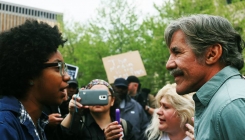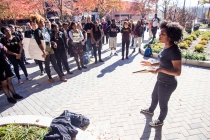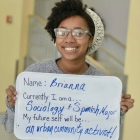
Courtesy of Brianna Jackson
Say hello to Brianna Jackson, current secretary of the Black Student Union and vice president of Zeta Sigma Chi Multicultural Sorority Inc. She is a junior, double majoring in sociology and Spanish with political aspirations. She recently led a march on campus to demand accountability for racist social media posts.
What causes would you say you are the most vocal about?
BJ: I mainly fight for the advancement of the black community, womanism, the LGBTQIA+ community and the mentally ill. These causes are most important to me for the simple fact that I have experienced all these levels of oppression in my daily life.
What event/events or actions have inspired you to become an activist?
BJ: What has had a great effect on me was the beginning of the Black Lives Matter movement in 2013, especially since I graduated from high school the same year. The media coverage from Ferguson in 2014 had non-stop images of tear gas flooding city streets, Black activists being brutalized, Black youth wearing expressions as solemn as their parents — it was hard to stomach the nation reacting to such a tragedy with apathy and violent fear. Then April 2015 came around and I basically lost my mind. It felt like Baltimore was my child and they were being tortured right in front of me. A lot of the passion and energy I put towards activism comes from knowing that my actions and my words have the potential to facilitate change for someone that I know personally, and in areas beyond racial injustice. I take activism very personally.

Brianna Jackson speaking in front of the Admin building on Wednesday, Nov. 4, 2015. The Black Student Union organized a march at free hour from the Yum Shoppe to Admin building in response to racial tension on campus. (Zachary Garmoe for TRW)
For someone who has any reservations about becoming an activist, what would you say to convince them to speak out against injustices?
BJ: I have so many tips, but if I had to choose it would be: “If you are neutral in situations of injustice, you have chosen the side of the oppressor.” Your voice carries more power than you think, even when it’s not being used. In times of emergency, your silence is consent. Get out there and get involved in your community, even if it means you have to start small. You can volunteer at a shelter, give a helping hand at a food bank, get started in a mentoring program — we need activists at every level of organizing, and I want you to know that anything you do can be an act of resistance. You are important and your voice is valuable.
What are some activists events that you have attended, whether on or off campus?
BJ: It depends on what you consider an activist event. Again, there are levels to this. I don’t think it does us service to ignore activism through coalition meetings, volunteering, lobbying, etc. Last week, I went to the Baltimore Mayoral Town Hall featuring some of the 2016 candidates as well as local leaders on a Q&A panel. It may not have been a protest, but it was important to have representatives there to speak on the interests of underrepresented groups. Our BSU’s general body meetings frequently touch on critical issues and solutions in our community, so I would consider that an activist event at times. Activism is a lifestyle and it manifests itself in just about everything I do.
After you graduate from UMBC, how do you plan to continue fighting the good fight?
BJ: After I graduate, I’ll be working towards establishing myself in Baltimore City. A goal of mine is to be on the City Council by the time I’m 25, and then possibly pursue the position of mayor, but I’m not sure yet. The inherent test of morality that people go through in politics is a deal breaker, but I would hope it doesn’t come to that point. I’ll be focusing a lot on community engagement, branding myself and getting more involved in local government. I hope to dedicate a lot my free time to volunteering.
What is one major change that you would propose on campus to make UMBC more inclusive, diverse, friendly, better, etc.?
BJ: This campus would truly benefit from the implementation of cultural sensitivity training for all students and faculty. The training could touch on topics such as cultural appropriation, customs and traditions from different religions, pejorative terms, etc. It’s mandatory for freshmen to take an online course about alcohol because UMBC recognizes alcohol abuse as a major problem. It’s mandatory for staff, faculty, sports teams and Greek organizations to attend a seminar on sexual assault because UMBC recognizes sexual violence as a major problem. As a university that is specifically advertised and appraised as one of the most diverse, up-and-coming campuses in the nation, we must practice what we preach. No doubt UMBC has diversity initiatives far beyond other schools, but it’s time for them to take it a step further than having a diverse student body; UMBC must ensure that it is actively facilitating a diverse social climate as well. Through the training, we take responsibility as individuals and as a community to keep ourselves informed.






